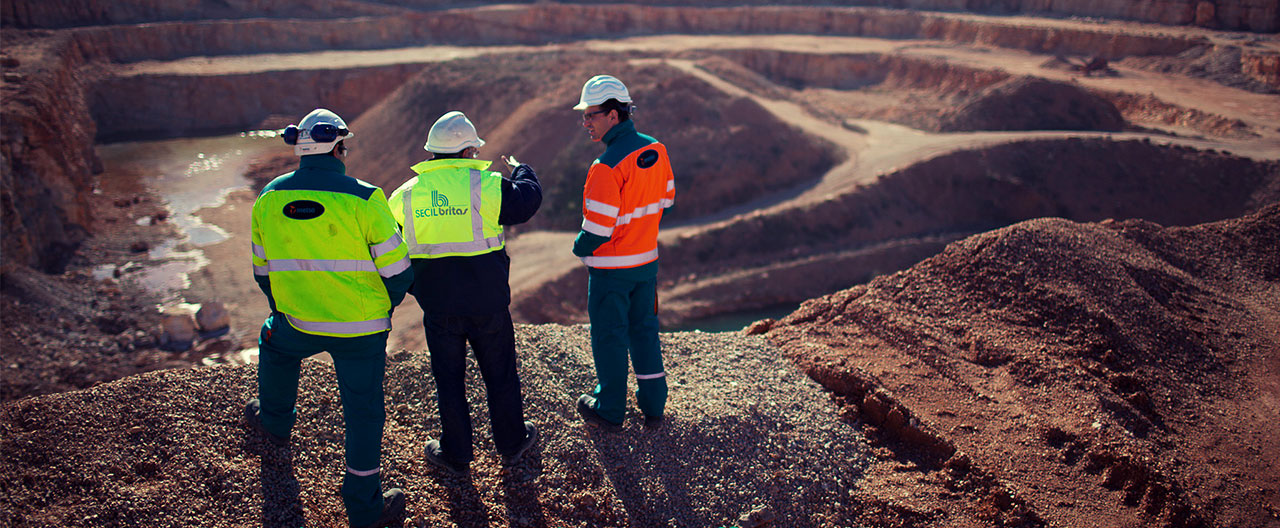“With the Lokotracks, we are able to achieve three main targets: produce all end products that our customers request, move the equipment flexibly between our quarries, and effectively exploit even smaller quarry areas,” says Franclim Venda, Director of Secil-Britas for the southern market in the Algarve.
When demand for aggregates is low, we can smoothly circulate one team of operators and equipment between our four quarries, resulting in a cost-effective operation. In a tourist area like the Algarve, at the Matos da Picota, in Loulé, which contains more than 30 hectares of exploitation area, landscaping has already been carried out, with a number of trees being planted on the old benches.”
“Since we have to operate the quarry in a much smaller area, we could now dismantle the old plant, and effectively utilize the rock deposit under the plant with Lokotrack mobile equipment.”
Metso cooperation for more than 30 years
Started as a family company in the early 1970s, one of Portugal’s leading cement companies, Secil, bought Ecob in 1988. The cooperation with Metso started in 1980, and today, about 90 percent of Secil Britas’ four southern quarries are operated using Metso’s crushing and screening equipment.
“Good personal and business relations are the key to our long-standing cooperation. Metso has always supported us with a professional approach, and has also provided us with all the necessary technical support we need,” Venda says.
“Based on good experiences right from the start, Metso’s quarry equipment serves as an example for competitor quarries, when choosing their equipment and services. Remarkable synergies in spare and wear parts can be achieved, for example, while using the NP1415 impact crusher both at our mobile and stationary facilities,” he states.
From coarse gravel to fine powder
Secil-Britas bought their first mobile equipment, LT1415S, a track-mounted, mobile impact crushing plant with a screen module, in 2008. It was followed by an ST620 mobile screen and, a year later, in 2010, another mobile screen, the Lokotrack ST3.8, was added.
With its three-stage mobile fleet, Secil-Britas is able to provide its customers with a full range of aggregates, from coarse gravel for road base to various types of aggregate for concrete and asphalt, to fine powder for pavements. All of the above products are made using mobile equipment and extracted from high-quality limestone deposits.
Stationary sand making and washing
Besides the dry products, Secil-Britas runs at their Escarpão-Albufeira quarry a complete, sand manufacturing and washing plant, delivered by Metso in 2002.
For this high-quality limestone quarry, washing was necessary due to the clay contents. The sand that is produced is used in the company’s own concrete production.
Because of the importance of tourism in the Algarve area, it is today prohibited to dig and use any natural sand in this southern region of Portugal. Therefore, the manufacture of sand from rock has become the only choice for local quarries to serve the need for concrete making.
If natural sand is required, it must be transported by train or trucks from distances of more than 250 kilometers.
Due to the transportation costs, manufactured sand is today the most economical choice in the Algarve area. The sales price of natural sand is almost double compared to manufactured sand.
M. Picota-Loulé quarry
End products
- 7–14 mm and 14–22 mm for concrete production
- 0–40 mm (long aggregates) for road construction
- 0–4 mm for various concrete grades and laying pavements
Metso equipment on site: LT1415S mobile impact crushing plant, css 60–120 mm, ST620 mobile screen, ST3.8 mobile screen
Escarpão quarry
End products
- 0–1.5 mm and 1.5–3.5 mm washed, manufactured sands
- 7–14 mm, washed aggregates
- 0–4 mm, 4–7 mm, 7–14 mm, 14–22 mm and 22–40 mm dry aggregates
- 0–40 mm long aggregates for road construction
Metso equipment on site: Nordberg NP1415 impact crusher, HP100 cone crusher, CVB2060 screen, TS403 screen (2), Logwasher SW1165 sand trap (2)
